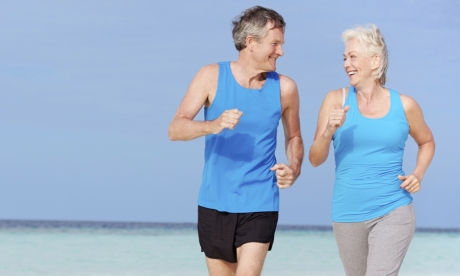Weak bones may seem like a problem of aging, but there’s plenty we can do early in life – in our 20s and even teens – to make sure bones stay healthy later in life.
Bones are the support system of the body, so it’s important to keep them strong and healthy. Bones are continuously being broken down and rebuilt in tiny amounts. Before about age 30, when bones typically reach peak bone mass, the body is creating new bone faster, but after age 30, bone building shifts and more bone is lost than gained.
Some people have a lot of savings in their “bone bank” because of factors including genetics, diet, and how much bone they built up as teenagers. The natural depletion of bone doesn’t affect these individuals too drastically. But in those with a smaller bone bank, when the body can’t create new bone as fast as the old bone is lost, osteoporosis can set in, causing bones to become weak and brittle and to fracture more easily. The disease is most common in postmenopausal women over the age of 65, and in men over the age of 70.
Although menopause and older age may seem like it is a long way off, once these milestones set in, it’s extremely hard to reverse. Since there’s no way of being 100 percent positive you’ll develop osteoporosis, the best way to counteract it is to take steps earlier in life to beef up bone mass (and prevent its loss) as much as possible.
Unfortunately, some are more likely than others to develop osteoporosis and weak bones in general, especially white and Asian postmenopausal women. But there are some things that can be changed to bump up bone mass. Here are 10 tips to make deposits in your bone bank for a healthier future.
1. Know your family history. Family history is a key indicator of bone health. Those with a parent or sibling who has or had osteoporosis are more likely to develop it.
2. Boost calcium consumption. When most people think bones, they think calcium. This mineral is essential for the proper development of teeth and bones. Calcium also contributes to proper muscle function, nerve signaling, hormone secretion, and blood pressure.
Help your body absorb calcium by pairing calcium-rich foods with those high in vitamin D. Foods that are good sources of calcium include yogurt, cheese, milk, spinach, and collard greens.
3. Don’t forget the vitamin D. Where there’s calcium, there must be vitamin D. The two work together to help the body absorb bone-boosting calcium. Boost vitamin D consumption by munching on shrimp, fortified foods like cereal and orange juice, sardines, eggs (in the yolks) and tuna, or opt for a vitamin D supplement.
4. Boost bone density with vitamin K. Vitamin K is mostly known for helping with blood clotting, but it also helps the body make proteins for healthy bones. Foods like kale, broccoli, Swiss chard, and spinach are high in vitamin K.
5. Pump up the potassium. Potassium isn’t necessarily known for aiding bone health: it’s a mineral that helps nerves and muscles communicate and also helps cells remove waste. But it turns out potassium may neutralize acids that remove calcium from the body.
Studies in both pre- and postmenopausal women have shown that a diet high in potassium can improve bone health. Load up on potassium by eating foods sweet potatoes, white potatoes (with the skin on), yogurt, and bananas.
6. Make exercise a priority. Regular exercise is key to keep a number of health issues at bay, and bone health is no exception. Living a sedentary lifestyle is considered a risk factor for osteoporosis. What type of exercise is most effective? Weight-bearing exercises like running, walking, jumping rope, skiing, and stair climbing keep bones strongest. Bonus for the older readers: improved strength and balance helps prevent falls (and the associated fractures) in those who already have osteoporosis.
7. Consume less caffeine. Caffeine does have some health benefits, but unfortunately not for our bones. Too much of it can interfere with the body’s ability to absorb calcium.
8. Cool it on the booze. But like caffeine, there’s no need to quit entirely. While heavy alcohol consumption can cause bone loss (because it interferes with vitamin D doing its job), moderate consumption (that’s one drink per day for women, two per day for men) is fine — and recent studies actually show it may help slow bone loss.
9. Quit smoking. Here’s yet another reason to lose the cigarettes: multiple studies have shown that smoking can prevent the body from efficiently absorbing calcium, decreasing bone mass.
10. Don’t be an astronaut. Not to squash any childhood dreams, but because of hours and hours of weightlessness and low-calcium diets, astronauts often suffer from space-induced osteoporosis. Space-anything sounds kind of awesome, but space bones definitely aren’t: astronauts can lose up to 1 to 2 percent of their bone mass per month on a mission! For those who simply must visit the moon, there is a possible solution: two studies have found that vitamin K can help build back astronauts’ lost bone — more than calcium and vitamin D.

